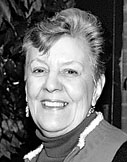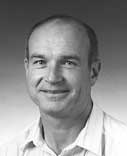Faith Vlcek
Faith Vlcek, a University employee for more than 10 years, was killed Feb. 10 in a car accident.
Vlcek was as a program administrator for the International Policy Center at the Gerald R. Ford School of Public Policy. Prior to joining the Ford School in 2007, she worked at the Stephen M. Ross School of Business and the William Davidson Institute (WDI).

Vlcek’s colleagues at the Ford School remember her kind heart and her ready willingness to lend a helping hand.
“The faculty, staff and students of Ford School are shocked and saddened by the loss of our friend and colleague, Faith Vlcek,” says Dean Susan Collins. “She was an incredibly positive and active member of our community and we will miss her tremendously.”
Vlcek worked at the William Davidson Institute from 1998-2004, serving as the executive assistant to Executive Director and Professor Jan Svejnar. She provided top-notch administrative support in that role, colleagues say, including the management of complex global travel arrangements for faculty and distinguished guests from all over the world.
Svejnar and Professor Kathy Terrell worked closely with Vlcek for more than a decade at WDI and the Ford School.
“Faith became an integral part of our lives and we will miss her enormously in many, many ways,” Terrell says. “So will the numerous visiting faculty who have sent us condolences from all over the world. Everyone remembers Faith as being an extraordinarily helpful and caring person.”
After her time at WDI, Vlcek worked for four years with the Faculty Support group at the Ross School. She received her Bachelor of Science in secondary education from Ohio University.
Vlcek lived in Tecumseh. She is survived by two children, five grandchildren and three siblings. Funeral services were held Feb. 15. Memorial contributions may be given to Gloria Dei Lutheran Church or the Faith Vlcek Memorial Wrestling Scholarship Fund. For more information go to www.borekjennings.com.
Frank Filisko
Frank Edward Filisko, a professor in the Department of Materials Science and Engineering and director of the Macromolecular Science & Engineering Program, died Nov. 11 after a two-year battle with leukemia. He was 66.

Filisko was born in Loraine, Ohio, and lived there until he entered Colgate University in Hamilton, N.Y. to study physics and to play football. He graduated from Colgate with a Bachelor of Arts degree in 1964. After this he went to Purdue University to study solid state physics and received an Master of Science degree in 1966. This also is where he met his wife, Doris. He then returned to Ohio to attend Case Western Reserve University and to study polymer physics.
Filisko’s advisor at Case was S.H. Maron, the co-author of a well-known textbook on thermodynamics. Filisko involved himself with thermodynamics, making measurements for his thesis on the heats of solution of several polymers in selected solvents. He received his doctoral degree from Case in 1969 but stayed on as a post-doctoral fellow, working with Phillip Geil studying native (rat tail tendon) collagen.
In 1970 he joined U-M and the Department of Chemical and Metallurgical Engineering as an assistant professor. Soon after when the department split into chemical and metallurgical branches, Filisko went with the metallurgical branch, which now is known as the Department of Materials Science and Engineering. He was promoted to full professor in 1984.
Filisko also was active in the Macromolecular Science & Engineering Program since its founding in 1978. He became its director in 1987 and continued until 1995, though his title remained acting director. At the time, there was some thought that the macro program might cease to exist, but Filisko kept it alive through very strenuous efforts, colleagues say.
Filisko loved teaching and research. He taught a broad range of courses. He excelled at teaching the introductory materials science and engineering course (MSE 220), but he also taught the polymers course, the kinetics course, a senior design course and during his last term of teaching a junior- level lab. A popular course was Applied Polymer Processing, and he also initiated the Biomaterials course (MSE 410/BioMed 410.
For his research, Filisko liked to work directly with his students. He felt that as a mentor he would be most successful when he was in the lab working alongside them, experiencing their successes and periodically having to fix their instruments, colleagues say.
Besides the thermodynamic measurements on polymers early in his career, he received even greater notice for his work on electrorheological fluids (fluids that change their flow properties, mainly viscosity, in the presence of electric fields). This work was so well regarded that Filisko was invited for research and for conferences all around the world.
He also had a long and productive association with the School of Dentistry and the Department of Biologic and Materials Science. Papers from that collaboration involved typical biomaterial concerns, like cytotoxicity, protein adsorption, thrombogenesis and hemocompatibility.
As his children Theresa, Andrew and Edward were growing up, Filesko participated in their activities as a football coach and scoutmaster.
An endowment fund has been established in Filisko’s name to encourage excellent student research in the fields of polymer science and engineering. For more information contact Nonna Hamilton at 763-2316 or e-mail [email protected].
— This article written by Richard Robertson originally appeared in LSA Engineering’s MacroMessenger newsletter

